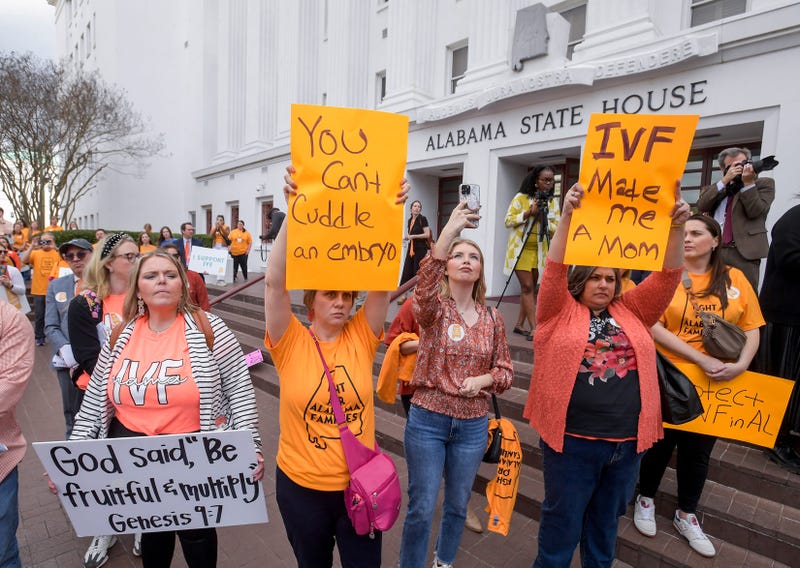
MONTGOMERY, Ala. (AP) — Groups representing Alabama doctors and hospitals urged the state Supreme Court Friday to revisit a decision equating frozen embryos to children, saying the ruling is blocking fertility treatments and harming the medical community.
The Medical Association of the State of Alabama and the Alabama Hospital Association filed a brief supporting a rehearing request in the case that has drawn international attention.
Courts do not often grant such requests, but the organizations argued that the ruling is having sweeping consequences as fertility clinics pause IVF services. They also said it is creating a cloud of uncertainty for the medical community.
"Many aspiring parents will not be able to have children as a result of this court's holding. This is a tragedy across Alabama," lawyers for the organizations wrote.
Last month Alabama justices ruled that three couples could pursue wrongful death lawsuits for their "extrauterine children" after their frozen embryos were destroyed in an accident at a storage facility. The decision, which treated the embryos the same as a child or gestating fetus under the state's wrongful death law, raised concerns about civil liabilities for clinics.
The defendants in the lawsuits — The Center for Reproductive Medicine and the Mobile Infirmary — filed a rehearing request with the court Friday.
Attorneys for the providers argued that the ruling is not consistent with other state laws. The state's fetal homicide law and abortion ban were written to cover fetuses and embryos "in utero," meaning in the uterus.
They also noted that Alabama lawmakers are attempting to find a way to resume IVF services by proposing lawsuit protections for clinics, writing, "The rushed reaction by our Legislature to try to address the issues created by the Court's opinion would seem to indicate the Legislature's intent is not what this Court presumed."
The plaintiffs in the case had undergone IVF treatments that led to the creation of several embryos, some of which were implanted and resulted in healthy births. The couples paid to keep others frozen at the Mobile Infirmary Medical Center.
According to the lawsuit, in 2020 a patient wandered into the storage area through an unlocked door, removed several embryos from a chamber and dropped them on the floor, destroying them.
'It's just the start'
Marisa McLellan, of Center City, had her twins via IVF.
She started with four embryos. One was unviable, two were successfully transferred, and the last one was destroyed.
“It was hard to let that embryo go because it was potential it was a possibility.”
She says the Alabama ruling equating embryos with children raises more questions than answers.
“It seems outrageous to demand that people either pay for that in perpetuity or force someone to donate an embryo to someone else in that situation because it is your genetic material.”
She says she worries for the future of what’s already a stressful and costly procedure.
“... If you can't maximize the amount of eggs you gather during each egg retrieval, it makes IVF untenable,” she said.
Ilana Ponce saw many embryos fail during six years of IVF. She eventually was successful in getting pregnant at a clinic in Mexico.
“If they make it illegal, it's going to be a huge problem," Ponce said. "Will the clinics be shut down? … Are they all going to be able to travel somewhere? Is that going to be an issue?”
“I figure if they can do this in Alabama, it's just the start.”
The Alabama ruling currently does not pertain to any other state, but it’s revived attention on a federal bill sponsored by 125 Republicans that would protect all life from the moment of fertilization.
